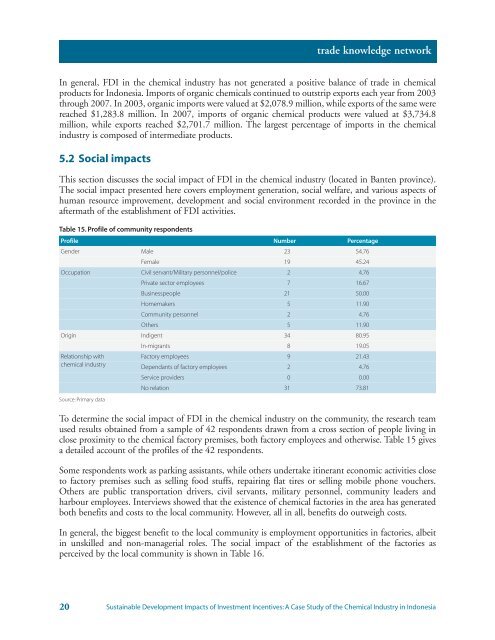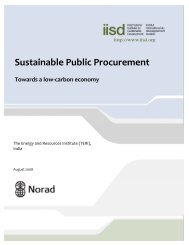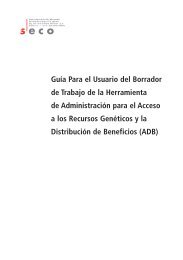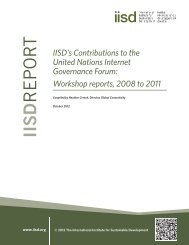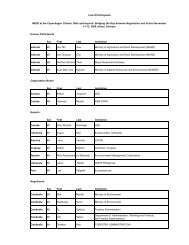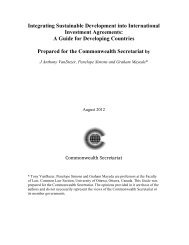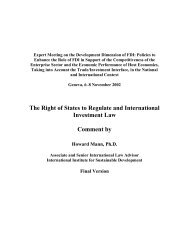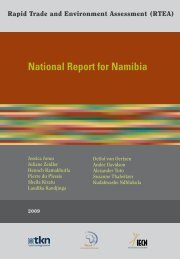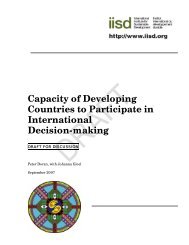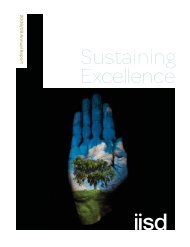Sustainable Development Impacts of Investment Incentives: A Case ...
Sustainable Development Impacts of Investment Incentives: A Case ...
Sustainable Development Impacts of Investment Incentives: A Case ...
You also want an ePaper? Increase the reach of your titles
YUMPU automatically turns print PDFs into web optimized ePapers that Google loves.
trade knowledge network<br />
In general, FDI in the chemical industry has not generated a positive balance <strong>of</strong> trade in chemical<br />
products for Indonesia. Imports <strong>of</strong> organic chemicals continued to outstrip exports each year from 2003<br />
through 2007. In 2003, organic imports were valued at $2,078.9 million, while exports <strong>of</strong> the same were<br />
reached $1,283.8 million. In 2007, imports <strong>of</strong> organic chemical products were valued at $3,734.8<br />
million, while exports reached $2,701.7 million. The largest percentage <strong>of</strong> imports in the chemical<br />
industry is composed <strong>of</strong> intermediate products.<br />
5.2 Social impacts<br />
This section discusses the social impact <strong>of</strong> FDI in the chemical industry (located in Banten province).<br />
The social impact presented here covers employment generation, social welfare, and various aspects <strong>of</strong><br />
human resource improvement, development and social environment recorded in the province in the<br />
aftermath <strong>of</strong> the establishment <strong>of</strong> FDI activities.<br />
Table 15. Pr<strong>of</strong>ile <strong>of</strong> community respondents<br />
Pr<strong>of</strong>ile Number Percentage<br />
Gender Male 23 54.76<br />
Female 19 45.24<br />
Occupation Civil servant/Military personnel/police 2 4.76<br />
Private sector employees 7 16.67<br />
Businesspeople 21 50.00<br />
Homemakers 5 11.90<br />
Community personnel 2 4.76<br />
Others 5 11.90<br />
Origin Indigent 34 80.95<br />
In-migrants 8 19.05<br />
Relationship with Factory employees 9 21.43<br />
chemical industry Dependants <strong>of</strong> factory employees 2 4.76<br />
Source: Primary data<br />
Service providers 0 0.00<br />
No relation 31 73.81<br />
To determine the social impact <strong>of</strong> FDI in the chemical industry on the community, the research team<br />
used results obtained from a sample <strong>of</strong> 42 respondents drawn from a cross section <strong>of</strong> people living in<br />
close proximity to the chemical factory premises, both factory employees and otherwise. Table 15 gives<br />
a detailed account <strong>of</strong> the pr<strong>of</strong>iles <strong>of</strong> the 42 respondents.<br />
Some respondents work as parking assistants, while others undertake itinerant economic activities close<br />
to factory premises such as selling food stuffs, repairing flat tires or selling mobile phone vouchers.<br />
Others are public transportation drivers, civil servants, military personnel, community leaders and<br />
harbour employees. Interviews showed that the existence <strong>of</strong> chemical factories in the area has generated<br />
both benefits and costs to the local community. However, all in all, benefits do outweigh costs.<br />
In general, the biggest benefit to the local community is employment opportunities in factories, albeit<br />
in unskilled and non-managerial roles. The social impact <strong>of</strong> the establishment <strong>of</strong> the factories as<br />
perceived by the local community is shown in Table 16.<br />
20<br />
<strong>Sustainable</strong> <strong>Development</strong> <strong>Impacts</strong> <strong>of</strong> <strong>Investment</strong> <strong>Incentives</strong>: A <strong>Case</strong> Study <strong>of</strong> the Chemical Industry in Indonesia


